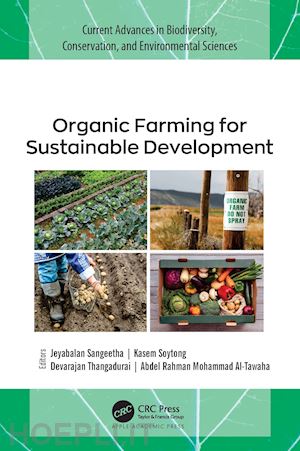PART I: Agrofriendly Microbes and Their Metabolites for Sustainable Agriculture 1. Trichoderma: An Eco-Friendly Biopesticide for Sustainable Agriculture Aparna B. Gunjal 2. Arbuscular Mycorrhizas: Applications in Organic Agriculture and Beyond Charles Oluwaseun Adetunji, Osikemekha Anthony Anani, Devarajan Thangadurai, and Saher Islam 3. Azospirillum Bioinoculant Technology: Past to Current Knowledge and Future Prospects Palani Saranraj, Abdel Rahman M. Al-Tawaha, Panneerselvam Sivasakthivelan, Abdel Razzaq M. Al-Tawaha, Kangasalam Amala, Devarajan Thangadurai, and Jeyabalan Sangeetha 4. Application of Phosphate Solubilizing Microorganisms for Effective Production of Next-Generation Biofertilizer: A Panacea for Sustainable Organic Agriculture Charles Oluwaseun Adetunji, Osikemekha Anthony Anani, Devarajan Thangadurai, and Saher Islam 5. Recent Trends in the Utilization of Endophytic Microorganisms and Other Biopesticidal Technology for the Management of Agricultural Pests, Insects, and Diseases Charles Oluwaseun Adetunji, Osikemekha Anthony Anani, Saher Islam, and Devarajan Thangadurai 6. Secondary Metabolites and Their Biological Activities From Chaetomium Kasem Soytong and Somdej Kanokmedhakul PART II: Organic Amendments and Sustainable Practices for Plant and Soil Management 7. Garlic Products for Sustainable Organic Crop Protection Anjorin Toba Samuel and Adeniran Lateef Ariyo 8. Efficacy of Organic Substrates for Management of Soil-Borne Plant Pathogens Malavika Ram Amanthra Keloth, Meenakshi Rana, and Ajay Tomer 9. Organic Farming Improves Soil Health Sustainability and Crop Productivity Abdel Rahman M. Al-Tawaha, Elif Günal, Ismail Çelik, Hikmet Günal, Abdulkadir Sürücü, Abdel Razzaq M. Al-Tawaha, Alla Aleksanyan, Devarajan Thangadurai, and Jeyabalan Sangeetha 10. Use of Biochar in Agriculture: An Inspiring Way in Existing Scenario Imran, Amanullah, Abdel Rahman M. Al-Tawaha, Abdel Razzaq M. Al-Tawaha, Samia Khanum, Devarajan Thangadurai, Jeyabalan Sangeetha, Hiba Alatrash, Palani Saranraj, Nidal Odat, Mazen A. Ateyya, Munir Turk, Arun Karnwal, Sameena Lone, and Khursheed Hussain 11. The Role of Organic Mulching and Tillage in Organic Farming Shah Khalid, Amanullah, Abdel Rahman M. Al-Tawaha, Nadia, Devarajan Thangadurai, Jeyabalan Sangeetha, Samia Khanum, Munir Turk, Hiba Alatrash, Sameena Lone, Khursheed Hussain, Palani Saranraj, Nidal Odat, and Arun Karnwal 12. Weed Management in Organic Cropping Systems Abdel Rahman M. Al-Tawaha, Zahra Farrokhi, Nandhini Yoga, Poonam Roshan, Imran, Amanullah, Abdel Razzaq M. Al-Tawaha, Alla Aleksanyan, Samia Khanum, Devarajan Thangadurai, Jeyabalan Sangeetha, Abdur Rauf, Shah Khalid, Palani Saranraj, Abdul Basit, Ayse Yesilayer, Hiba Alatrash, Mazen A. Ateyya, Munir Turk, Arun Karnwal, Sameena Lone, and Khursheed Hussain PART III: Organic Agriculture for Food Safety 13. Organic Production Technology of Rice Shah Khalid, Amanullah, Nadia, Imranuddin, Mujeeb Ur Rahman, Abdel Rahman M. Al-Tawaha, Devarajan Thangadurai, Jeyabalan Sangeetha, Samia Khanum, Munir Turk, Hiba Alatrash, Sameena Lone, Khursheed Hussain, Palani Saranraj, and Arun Karnwal 14. Prospects of Organic Agriculture in Food Quality and Safety Akbar Hossain, Debjyoti Majumder, Shilpi Das, Apurbo Kumar Chaki, Mst. Tanjina Islam, Rajan Bhatt, and Tofazzal Islam 15. Organic Foods in Sub-Saharan Africa: Health Impact, Farmers’ Experiences, and International Trade Osebhahiemen Odion Ikhimiukor, Oluwadamilola Mathew Makinde, Chibuzor-Onyema Ihuoma Ebere, Toba Samuel Anjorin, and Fapohunda Stephen Oyedele












